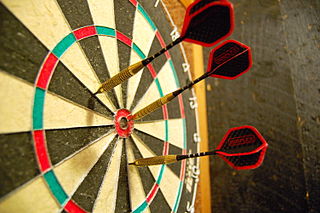This article needs additional citations for verification .(October 2013) (Learn how and when to remove this template message) |
 | |
| Website | www |
|---|---|
Oxford University Darts Club runs the inter-collegiate darts league which is the fifth best participated sport at the university. [1] Around 300 players compete in the inter-collegiate league each week, representing one of the 25 college teams entered into the competition.[ citation needed ] The team also competes against a team from the University of Cambridge in the varsity match. This was televised by the BBC in 2005 but has been described as "the worst display of darts ever to grace the BDO World Championship stage and television screens." [2]

The University of Oxford has 38 Colleges and six Permanent Private Halls (PPHs) of religious foundation. Colleges and PPHs are autonomous self-governing corporations within the university, and all teaching staff and students studying for a degree at the university must belong to one of the colleges or PPHs. These colleges are not only houses of residence, but have substantial responsibility for teaching undergraduate students. Generally tutorials and classes are the responsibility of colleges, while lectures, examinations, laboratories, and the central library are run by the university. Most colleges take both graduates and undergraduates, but several are for graduates only.

Darts is a sport in which small missiles are thrown at a circular target ("dartboard") fixed to a wall. Though various boards and rules have been used in the past, the term "darts" usually now refers to a standardised game involving a specific board design and set of rules. As well as being a professional competitive game, darts is a traditional pub game, commonly played in the United Kingdom and the Republic of Ireland, across the Commonwealth, the Netherlands, Belgium, Germany, the Scandinavian countries, the United States, Australia and elsewhere.

The University of Oxford is a collegiate research university in Oxford, England. There is evidence of teaching as early as 1096, making it the oldest university in the English-speaking world and the world's second-oldest university in continuous operation. It grew rapidly from 1167 when Henry II banned English students from attending the University of Paris. After disputes between students and Oxford townsfolk in 1209, some academics fled north-east to Cambridge where they established what became the University of Cambridge. The two 'ancient universities' are frequently jointly called 'Oxbridge'. The history and influence of the University of Oxford has made it one of the most prestigious universities in the world.
